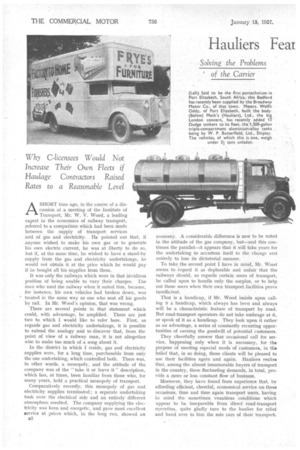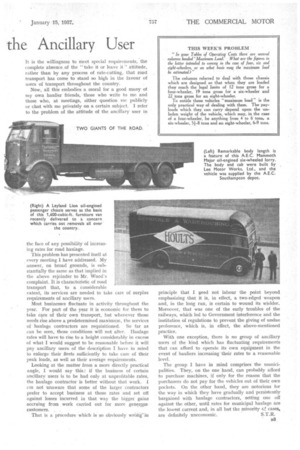Hauliers Feat
Page 36

Page 37

If you've noticed an error in this article please click here to report it so we can fix it.
• the Ancillary User
Solving the Problems
L
of tne Carrier Why C-licensees Would Not Increase Their Own Fleets if Haulage Contractors Raised Rates to a Reasonable Level ASHORT time ago, in the course of a discussion at a meeting of the Institute of Transport, Mr. W. V. Wood, a leading expert in the economics of railway transport, referred to a comparison which had been made between the supply of transport services and of gas and electricity. He pointed out that, it anyone wished to make his own gas or to generate his own electric current, he was at liberty to do so, but if, at the same time, he wished to have a stand-by supply from the gas and electricity undertakings, he would not obtain it at the price which he would pay if he bought all his supplies from them.
It was only the railways which were in that invidious position of being unable to vary their charges. The man who used the railway when it suited him, because, for instance, his own vehicles had broken down, was " treated in the same way as one who sent all his goods by rail. In Mr. Wood's opinion, that was wrong.
There are several points in that statement which could, with advantage, be amplified. There are just two to which I would like to refer here. First, as regards gas and electricity undertakings, it is possible to extend the analogy and to discover that, from the point of view of a railway man, it is not altogether wise to make too much of a song about it.
In the district in which I reside, gas and electricity supplies were, for a long time, purchasable from only the one undertaking, which controlled both. There was, in other words, a monopoly, and the attitude of the company was of the "take it or leave it" description, which has, at times, been familiar from those who, for many years, held a practical monopoly of transport.
Comparatively recently, this monopoly of gas and electricity supplies terminated; a separate undertaking took over the electrical side and an entirely different atmosphere resulted. The company supplying the electricity was keen and energetic, and gave most excellent service at prices which, in the long run, showed an
economy. A considerable difference is now to be noted in the attitude of the gas company, but—and this continues the parallel—it appears that it will take years for the undertaking to accustom itself to the change and entirely to lose its dictatorial manner.
To take the second point I have in mind, Mr. Wood seems to regard it as deplorable and unfair that the railways should, as regards certain users of transport, be called upon to handle only the surplus, or to help out those users when their own transport facilities prove insufficient.
That is a handicap, if Mr. Wood insists upon calling it a handicap, which always has been and always will be a characteristic feature of transport by road. 33ut road-transport operators do not take umbrage at it, or speak of it as a handicap. They look upon it rather as an advantage, a series of constantly recurring opportunities of earning the goodwill of potential customers.
They cheerfully answer that occasional call for service, happening only when it is necessary, for the purpose of meeting especial needs of customers, in the belief that, in so doing, those clients will be pleased to use their facilities again and again. Hauliers realize that, among the almost innumerable buyers of transport in the country, these fluctuating demands, in total, provide a more or less constant flow of business.
Moreover, they have found from experience that, by affording efficient, cheerful, economical service on these occasions, time and time again transport users, having in mind the sometimes vexatious conditions which appear to be inseparable from direct road-transport operation, quite gladly turn to the haulier for relief and hand over to him the sole care of their transport. It is the willingness to meet special requirements, the complete absence of the "take it or leave it" attitude, rather than by any process of rate-cutting, that road transport has come to stand so high in the favour of users of transport throughout the country.
Now, all this embodies a moral for a good many of my own haulier friends, those who write to me and those who, at meetings, either question me publicly or chat with me privately on a certain subject. I refer to the problem of the attitude of the ancillary user in the face of any possibility of increasing rates for road haulage.
This problem has presented itself at every meeting I have addressed. My answer, on broad grounds, is substantially the same as that implied in the above rejoinder to Mr. Wood's complaint. It is characteristic of road transport that, to a considerable extent, its services are needed to take care of surplus requirements of ancillary users.
Most businesses fluctuate in activity throughout the year. For part of the year it is economic for them to take care of their own transport, but whenever those needs rise above a predetermined maximum, the services of haulage contractors are requisitioned. So far as can be seen, those conditions will not alter. Haulage rates will have to rise to a height considerably in excess of what I would suggest to be reasonable before it will pay ancillary users of the description I have in mind to enlarge their fleets sufficiently to take care of their peak loads, as well as their average requirements.
Looking at the matter from a more directly practical angle, I would say this : if the business of certain ancillary users is to be had only at unprofitable rates, the haulage contractor is better without that work. am not unaware that some of the larger contractors prefer to accept business at those rates and set off against losses incurred in that way the bigger gains accruing from work carried out for more generous
customers. • That is a procedure Which is so obviously wrinirin principle that I peed not labour the point beyond emphasizing that it is, in effect, a two-edged weapon and, in the long run, is certain to wound its wielder. Moreover, that was one of the early troubles of the railways, which led to Government interference and the institution of regulations to prevent the giving of undue preference, which is, in effect, the above-mentioned practice.
With one exception, there is no group of ancillary users of the kind which has fluctuating requirements that can afford to operate its own equipment in the event of hauliers increasing their rates to a reasonable level.
The group I have in mind comprises the municipalities. They, on the one hand, can probably afford to purchase machines, if only for the reason that the purchasers do not pay for the vehicles out of their, own pockets. On the other hand, they are notorious for the way in which they have gradually and 'persistently bargained with haulage contractors, setting one off against the other, until rates for municipal haulage are the lowest current and, in all but the minority cf cases.
are definitely uneconomic. S.T.R.




















































































